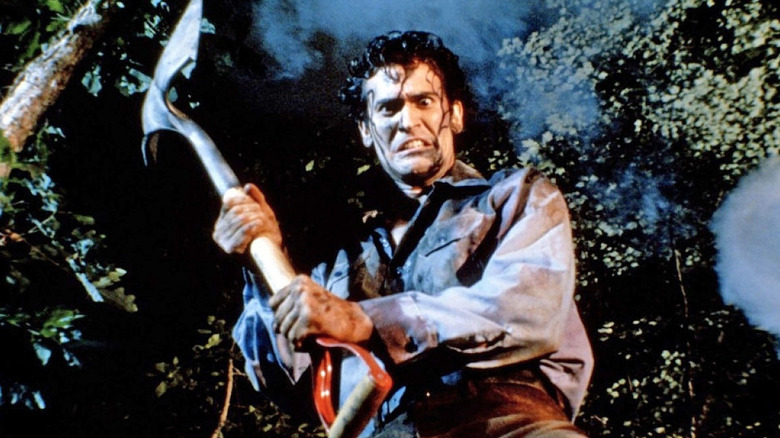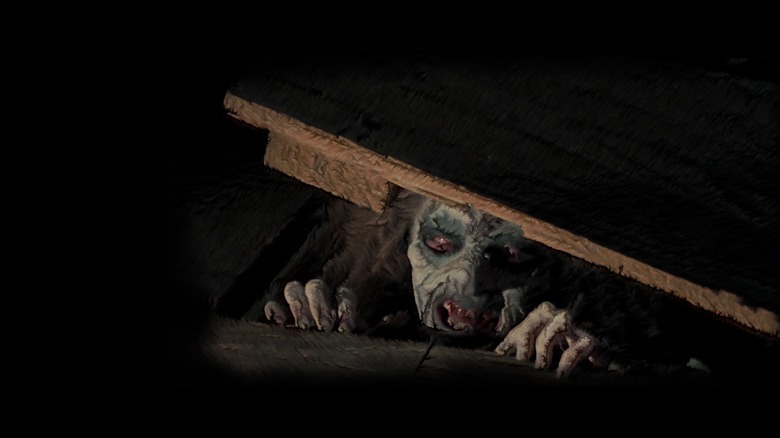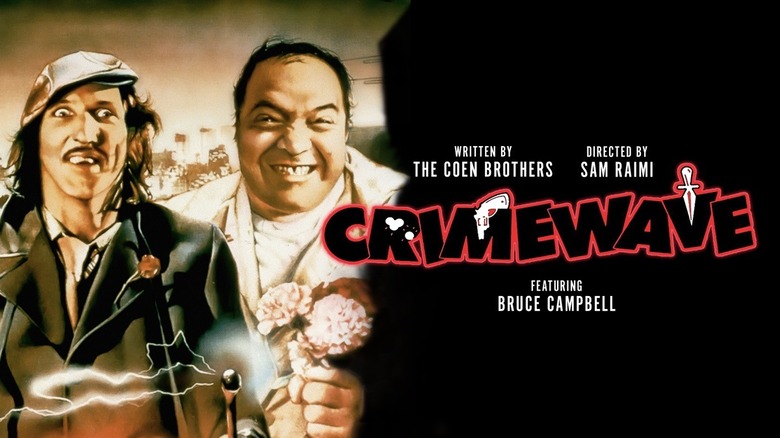Joel Coen Helped Edit This Classic 1980s Horror Movie
Before Joel Coen made waves during the recent festival circuit for going sans Ethan for his 2021 directorial effort "The Tragedy of Macbeth," it was not completely unheard of for him to work without his brother. Especially during the early days of the fraternal filmmakers' collegiate education, it appeared that their prospective fields of interests were not totally aligned. While Ethan was off pursuing a bachelor's in philosophy at Princeton in New Jersey, Joel was enrolled at the prestigious undergraduate film program at NYU, where he began to carve out his unique cinematic voice (though I'm sure Ethan's 41-page thesis titled "Two Views of Wittgenstein's Later Philosophy" was riveting all the same). During this era, Joel made some career connections that would prove fruitful for years to come — one in particular influencing Joel to make "Blood Simple" with Ethan shortly afterwards. Surely, Ethan's philosophical musings were also essential in crafting their anxiety-laden debut, but Joel's work on a specific '80s horror classic while still a fledgeling filmmaker can definitely be felt in the Coen's early work and future collaborations.
The Evil Dead
The film in question is none other than Sam Raimi's iconic 1981 supernatural spectacle "The Evil Dead." For those who aren't familiar, the cult classic follows a group of college students who rent a remote cabin in Tennessee for what's supposed to be a relaxing getaway. Once they find a worrisome tape recording in the cellar that recites an incantation for summoning a demon, it's already too late for the co-eds, who meet grisly fates ranging from full-blown possession to being impaled by sentient trees in the forest that surrounds the cabin.
After Raimi shot the film, he was inundated with footage and not making much progress sifting through it. Thus, he brought on Detroit-based editor Edna Paul to assist, who happened to be mentoring Joel Coen at the time (in a case of coming full-circle, Paul would then consult on "Blood Simple" three years later). This was relatively soon after Joel dropped out of the graduate film program at the University of Texas at Austin, where he enrolled in order to follow his then-wife, who was studying linguistics. They divorced shortly after, culminating in Joel leaving the program after just nine months. Luckily for him, his filmmaking trajectory would clearly not rely on a master's degree in order to advance. This is how Joel came to work on the film, and ultimately what sparked a friendship between himself, his brother and Raimi. It's also interesting to note the use of "shaky cam" shots in "The Evil Dead" — namely during the final scene, where an unseen entity darts through the cursed forest and blood-drenched cabin to pounce on final guy Ash (Bruce Campbell) before he can escape — and how this would be implemented in future Coen Brothers projects. Namely their 1984 debut "Blood Simple," which coincidentally leans into horror conventions far more than many of their other works (though no one will deny that their adaptation of Cormac McCarthy's "No Country for Old Men" is straight-up harrowing). However, the "shaky cam" is also used for slapstick comedic effect in other films of theirs, like the Nicolas Cage and Holly Hunter vehicle "Raising Arizona."
Joel's Work on 'The Evil Dead' Also Spawned a Coen/Raimi Crossover Film
After Raimi found success with "The Evil Dead" and the Coens received immediate buzz over "Blood Simple," the prospect of collaboration became alluring. One year after the Coens' debut and four years after Raimi's breakout, "Crimewave" was born. Written by the Coens and Raimi with the latter serving as director, the film follows a death row inmate and the uncanny experiences that led to his sentence. Unfortunately, the film was a total flop upon its release — a commercial failure and largely ignored by critics — and remains quite obscure to this day. Yet it's a veritable time capsule of both the Coens' and Raimi's narrative interests: It's a unique juxtaposition of genre (in this case, film noir crossed with slapstick) which would become part of the Coens' wheelhouse, as well as employing overt black comedy and morbidity that continues to pervade Raimi's work.
"Crimewave" additionally features uncredited cameos from Joel and Ethan as execution reporters, as well as Joel's newfound wife (and "Blood Simple" star) Frances McDormand as a jailhouse nun. Raimi's brother Ted also shows up as a waiter in a flashback, while Bruce Campbell returns as the dreaded Renaldo "The Heel," a veritable goon who is at least partially responsible for the protagonist ending up in the electric chair. It's an intriguing artifact that certainly serves as an early blueprint for what each filmmaker would continue to explore throughout the unfolding of their careers — a b-movie talisman that wouldn't exist without Joel's involvement on "The Evil Dead" 40 years ago.


